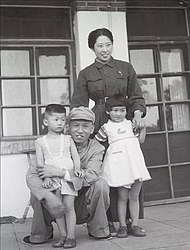Wang Guangmei
This article needs additional citations for verification. (January 2009) |
Wang Guangmei | |
|---|---|
王光美 | |
Spouse of the President of the People's Republic of China | |
| In office 27 April 1959 – 21 October 1968 | |
| President | Liu Shaoqi |
| Preceded by | Jiang Qing |
| Succeeded by | Lin Jiamei |
| Personal details | |
| Born | 26 September 1921 China |
| Died | 13 October 2006 (aged 85) Beijing, China |
| Spouse | |
| Children | Liu Yuan Liu Pingping |
| Relatives | Wang Guangying (brother) |
| Alma mater | Fu Jen Catholic University (Beijing) |
Wang Guangmei (Chinese: 王光美; pinyin: Wáng Guāngměi; Wade–Giles: Wang Kuang-mei; 26 September 1921 – 13 October 2006) was a Chinese politician, philanthropist and the wife of Liu Shaoqi, who served as the President of the People's Republic of China from 1959 to 1968.
Life
Early years

Wang Guangmei was born in 1921, and grew up in a distinguished and prominent Chinese family. Her father was a government minister and a diplomat; her mother was an educator. She studied French, Russian, and English; learning to speak all three, and earned a degree in physics from the
There, at the age of 24, she met Liu Shaoqi, who was nearly twice her age and had previously been married on five occasions. For years she served as his secretary, and he was named a key deputy to Chairman Mao Zedong after the Communists took power in 1949. In 1959, Liu was named Chinese President, making him the second-most powerful man in the country.
First lady

After Liu became president in 1959, Wang became a very visible diplomatic companion to him. Wang Guangmei became once widely known in China as its beautiful, articulate, sophisticated first lady.
Along with Liu Shaoqi, Wang led the Socialist Education Movement beginning in 1963.[3]: 209 Wang led investigative work teams to rural China in November of that year and to Tsinghua University in 1966.[3]: 209
Cultural Revolution
Liu and his wife became targets of the

Wang Guangmei's public role had antagonized Mao's wife
Wang was put under house arrest, then imprisoned. Her four children were also punished. Imprisoned in Qincheng Prison during the Cultural Revolution, Wang was kept in ignorance of her family's fate. After four years, her children asked Mao for permission to see their parents. It was through Mao's reply, "their father is dead but they may see the mother", that Wang learned of her husband's death. Wang spent about 12 years in prison, and was released in 1979 — before Mao's widow Jiang Qing and her Gang of Four, who were blamed for the excesses of the Cultural Revolution, were put on trial.
Later years
Soon, Liu's reputation was rehabilitated, and Wang received compensation for her suffering during the Cultural Revolution In March 1978, Wang was elected as a member of the Fifth National Committee of the Chinese People's Political Consultative Conference. In December of the same year, she her personal freedom and status were restored. In 1979, she served as Director of the Foreign Affairs Bureau of the Chinese Academy of Social Sciences. In 1980, she appeared in court during the trial of the Gang of Four as a victim of Jiang Qing's persecution. Later, Wang was elected a permanent member of the National People's Political Consultative Conference.
From 1984, she served as the chairwoman of the Beijing Alumni Association of Fu Jen Catholic University. In 1989, Wang Guangmei suffered from breast cancer and went through two major operations before and after. Later, due to tumor metastasis, she underwent major surgery again. In 1995, she founded the "Hope Project", a program which aided the poor in China. She donated her family's valuable antiques, a few dating back to the Qing and Song dynasties, to charity and donated the proceeds of 566,000 yuan to the "Hope Project". In October 1998, she won the honorary award of the third "China Population Award".
Around 2000, she underwent another operation, and her health gradually deteriorated. In 2005, she resigned from the post of planning director. Wang died on October 13, 2006, at the No. 305 Military Hospital in Beijing due to lung infection caused by heart failure. Her funeral was held at the Babaoshan Revolutionary Martyrs' Cemetery in Beijing on October 21, 2006.
Four days after her death, she was selected by the China Foundation for Poverty Alleviation as the winner of the 2nd China "Poverty Elimination Award" Achievement Award. On October 24, Fu Jen Catholic University in Taipei held a memorial service for her at the Yesheng Building on campus.
Family

Wang had four children: Liu Yuan, Liu Ting, Liu Pingping, Liu Xiaoxiao. Her son, retired general
References
Notes
- ^ Sydney Morning Herald. 23 October 2006. Retrieved 28 May 2020.
- ^ MacFarquhar, Roderick (1997). The Origins of the Cultural Revolution- 3. The Coming of the Cataclysm 1961-1966. pp. 399–402.
- ^ ISBN 9780231204477.
- OCLC 1104999295. Archivedfrom the original on 2020-08-23. Retrieved 2020-05-10.
- ^ Lawrence (2004), p. 198.
- ISSN 0021-9118.
Bibliography
- "Wang Guangmei and Peach Garden Experience," in Timothy Cheek, Klaus Mühlhahn, and Hans J. Van de Ven, ed., Chinese Communist Party : A Century in Ten Lives (Cambridge University Press, 2021).
- Lawrence, Alan (2004). China Since 1919 - Revolution and Reform: A Sourcebook. London and New York: Routledge. ISBN 0-415-25142-7.
- Salisbury, Harrison E (1992). The New Emperors. New York: Avon Books. ISBN 0-380-72025-6.
External links
- Short Biography on chinavitae.com
- "Wang Guangmei, 85, Dies; Former First Lady of China", The New York Times, October 17, 2006
- Wang Guangmei on China Digital Times
- Wang Guangmei on Guardian Unlimited
